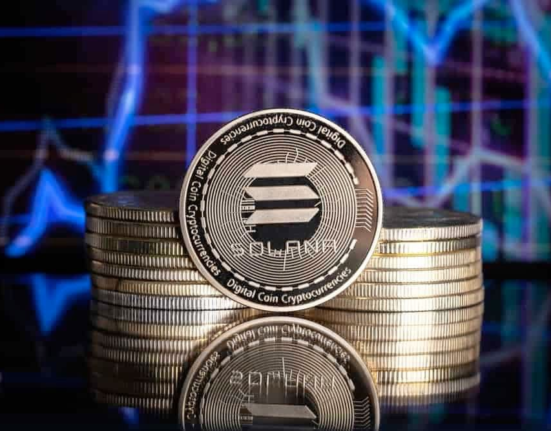Summary of Akash
- Akash is a decentralized cloud computing platform built with the Cosmos SDK
- The Akash network was launched in 2018 and is maintained by a renowned, global team
- By connecting providers with clients through a decentralized marketplace, Akash has created the first open source cloud platform
- AKT is the native utility and governance token of the Akash Network
Akash is an open-source and decentralized cloud computing platform built using the Cosmos software development kit (SDK) and implemented on the Cosmos blockchain.
Akash allows for the deployment of any cloud-native application, improving price-performance and scale for decentralized applications and organizations on its network. Akash is compatible with many existing cloud applications and allows businesses to participate in the decentralized cloud computing market.
Akash distributes underutilized cloud capacity to provide more efficient and cost effective cloud computing services than centralized alternatives. With its dedication to open source technology, the Akash network claims to be significantly less expensive than existing centralized cloud computing providers.
AKT is the native token powering the Akash network. It is used to govern and secure the network, store and exchange value across user, and incentivize participation in the network.
Table of Contents
How does Akash work?
Akash is a decentralized cloud computing marketplace that pools and reallocates idle computing processing power to customers that need it. Akash’s ‘Supercloud’ connects clients with providers through a transparent, distributed leasing service and preserves the benefits of decentralized computation through the Akash blockchain.
The flexibility of the protocol allows for movement between providers while offering performance benefits that come from global deployments. Providers, in turn, earn profits from unused capacity.
Through a virtualization process, computer resources are split into containerized applications. These ‘Containers’ are then leased to ‘Tenants’, the purchasers of cloud services on the network. ‘Providers’ bid on these requests after they are validated as orders, with the lowest bid for requested resources winning the lease.
Through this process, market participants each receive a financial incentive to use the network. Providers profit from monetizing their idle resources and Tenants benefit from lower costs. Marketplace transactions all occur on the Akash blockchain.
The AKT blockchain is secured by a Delegated Proof-of-Stake (DPoS) consensus mechanism. As such, the network depends on a system of validators and delegators. Validators on the AKT network commit new blocks to the blockchain through a voting process, using the tokens staked to them by delegators. Delegators stake their tokens to their chosen validators based on public information provided on the platform.
The protocol also implements a Tendermint algorithm for increased speed and scalability. With its transparent and permissionless process, Akash represents the first open-source, decentralized cloud platform.
Here’s a breakdown of how it works:
1. The Marketplace:
- Buyers: Individuals or businesses needing computing power for their applications can come to Akash’s marketplace. They specify their requirements and budget.
- Providers: Data center operators or anyone with spare computing resources can list their unused capacity on the marketplace, setting their own prices.
2. Matching Engine:
- AKT’s matching engine plays a critical role. It analyzes bids from providers and requests from buyers, considering factors like price, location, and desired specifications.
- The engine then connects suitable buyers with providers, facilitating deals.
3. Underlying Technology:
- AKT leverages blockchain technology** to ensure secure and transparent transactions.
- The Akash Network** is a blockchain-based marketplace where leasing agreements are recorded and validated.
- The Akash Platform** is an off-chain deployment tool used to manage and deploy applications on the resources acquired through the marketplace.
4. Key Advantages:
- Cost-effective: By leveraging unused resources, Akash offers potentially lower costs for compute power compared to traditional cloud providers.
- Efficiency: AKT promotes better utilization of data center capacity, reducing resource wastage.
- Transparency: Blockchain technology ensures secure and transparent transactions between buyers and providers.
5. Technical aspects to Consider:
- Akash Network: Built on Cosmos SDK, it uses a Delegated Proof-of-Stake (DPoS) consensus mechanism for security.
- Akash Platform: Kubernetes-powered, ensuring compatibility with various applications and containerization technologies.
What is the Akash Network Marketplace?
The Akash Network Marketplace is a platform that helps cloud providers match with compute-hungry users on a unified platform. The Marketplace lets users set a price they are willing to pay to deploy their software, while providers with extra compute bid to host the user’s application. AKT’s marketplace for underutilized compute functions in a similar fashion to popular web2 marketplaces like Airbnb and Uber, essentially acting as a matching engine between providers and users.
Akash vs. Big Tech
Akash takes advantage of the 85% of underutilized cloud capacity in 8.4 million data centers by letting anyone buy and sell compute on the Akash marketplace, providing a layer of blockchain-based via a decentralized and trustless environment. By leveraging an enormous amount of latent computing power, deploying containers on Akash costs ~10x less than the ‘big three’ cloud service providers shown below:
Akash vs. Other Decentralized Cloud Providers
Akash is not the only blockchain project vying to disrupt the half-trillion-dollar cloud computing market. Its competitors include Internet Computer, Ankr, and Cudos, with Cudos being the most similar to Akash.
Internet Computer is not a direct competitor to AKT’s marketplace for underutilized compute as it’s a system for node operators to pay data centers to host nodes while cloud providers get compensated for contributing compute capacity that facilitates network activity. Despite similarly making use of excess compute, Internet Computer does not generate market activity for cloud computing like AKT.
Ankr initially set out to use idle data center compute to build an open-source cloud, which would have made Ankr a near replica and direct competitor to AKT. However, Ankr pivoted to focus on specifically providing access to web3 infrastructure via RPCs that are used for making requests to servers.
Cudos plans to offer a similar product to AKT with a marketplace that would connect cloud providers with underutilized resources to builders wishing to deploy WASM containers and virtual machines. However, despite connecting idle compute power with builders, Cudos has no plans to operate its marketplace with a reverse auction or open-source its code like Akash.
Akash Token ($AKT)
AKT is a utility token with multiple uses in this protocol including security, rewards, network governance, and transactions. Akash is one of the few web3 protocols that actually generate revenue, which, in theory, will drive value to the AKT token. Per Web3 Index, as of writing this AKT has generated $62,055 in total fees, $10,905 over the past 90 days, and $2,535 over the past 30 days, with a 30D trend of -42%.

Web3 Infrastructure Q3 2021 Revenue (10/12/21)

7D Demand-side Protocol Fees (5/19/22)
Security
Node operators can only validate transactions on the AKT mainnet and receive in-kind rewards if they have a total stake that places them among the top 100 on-chain AKT holders. This stake total includes the amount the validator allocates itself combined with the amount delegated to them since Akash uses a DPoS consensus algorithm.
Rewards
AKT mentions in the white paper but has not yet implemented, its plan to charge a “take fee” for every successful lease. It would then send the fee to the Take Income Pool to be distributed to holders. The take fee is tentatively set to be 10% for AKT transactions and 20% for when other cryptocurrencies are used. Akash also plans to reward holders for the time lock0up of their AKT holdings. Holders who stake for longer periods of time will be eligible for larger rewards.
Governance
Similar to how Akash requires its node operators to have “skin in the game,” it also stipulates that only AKT holders can participate in governance. This includes submitting new proposals and casting votes. The cost of submitting a proposal is a non-refundable deposit of 1,000 AKT. For passed proposals that require code changes, validators must update the codebase to avoid penalties and continue validating the network.
Transactions
AKT acts as the ecosystem’s reserve currency, used for gas fees and as the default medium of exchange in transactions between providers and tenants. The Akash whitepaper details a yet-to-be-implemented settlement option to lock in an exchange rate between AKT and a settlement currency that’s meant to counter AKT price volatility in marketplace transactions.
AKT Token Distribution

AKT vesting data via Messari Research (3/29/22)
Pros and Cons of Akash Network (AKT)
Pros
- Cost-effectiveness: AKT Network offers a more affordable alternative to traditional cloud services, potentially reducing costs for businesses and individuals.
- Enhanced Security and Privacy: The decentralized nature of AKT Network provides enhanced security and privacy for users’ data.
- Scalability: Built on the Cosmos SDK, AKT Network is inherently scalable, capable of supporting a growing ecosystem of applications and services.
- Interoperability: The ability to integrate with other blockchain networks increases the utility and reach of Akash Network.
Cons
- Complexity and Learning Curve: The decentralized model and new technologies employed by AKT Network may present a learning curve for some users.
- Community Building: As a relatively new entrant, AKT Network needs to cultivate a strong community of developers, users, and providers to ensure widespread adoption and success.
Akash Network (AKT) Tokenomics
AKT Network stands at the intersection of blockchain technology and cloud computing, introducing a revolutionary approach to how computing resources are bought, sold, and utilized on a global scale. The native cryptocurrency token, AKT, is pivotal to the ecosystem, serving multiple crucial functions that facilitate the smooth and secure operation of the network.
Securing the Network
One of the primary roles of AKT is to secure the AKT Network through a process known as staking. Token holders can stake their AKT to participate in the network’s consensus mechanism, which is crucial for validating transactions and maintaining the blockchain’s integrity. This staking mechanism also acts as a deterrent against malicious activities, ensuring that the network remains secure and trustworthy.
Facilitating Transactions
AKT is used to pay for transactions within the AKT Network marketplace, including fees for deploying applications, renting computing resources, and other services provided by the platform. This use of AKT ensures a seamless and integrated economic system where participants are rewarded for contributing value to the ecosystem.
Incentivizing Participation
The tokenomics of AKT are designed to encourage active participation within the Akash Network. Staking rewards, distributed in AKT, are a key incentive, rewarding users for securing the network and participating in its governance. These incentives are crucial for building a robust and active community around the AKT Network, driving its growth and sustainability.
Growth and Expansion
As the Akash Network expands, the demand for AKT is expected to increase, reflecting its critical role in the ecosystem. The design of the AKT tokenomics ensures that as the network grows in usage and utility, the value and demand for AKT will likely follow, benefiting stakeholders and contributing to the network’s overall health and longevity.
Akash Network (AKT) Network Structure
The AKT Network is built on the Cosmos SDK, renowned for its emphasis on interoperability and scalability. This choice of foundation plays a significant role in the network’s structure and capabilities, positioning AKT Network as a versatile and future-proof platform in the blockchain and cloud computing landscapes.
Interoperability and Cross-Chain Collaborations
Thanks to the Cosmos SDK, Akash Network (AKT) can seamlessly integrate with other blockchain networks, facilitating cross-chain collaborations and transactions. This interoperability is a significant advantage, enabling Akash Network to function within a broader ecosystem of blockchain projects and services, and potentially tapping into new markets and use cases.
Decentralized and Permissionless Marketplace
The decentralized nature of the AKT Network, coupled with its permissionless marketplace, ensures that anyone, anywhere, can participate in the ecosystem. This democratization of cloud computing resources is a game-changer, offering an alternative to the monopolistic tendencies of traditional cloud services providers.
Total Supply of Akash Network (AKT)
The total supply of Akash Network (AKT) is designed with the network’s long-term viability in mind. The supply cap ensures scarcity and value preservation, while also providing enough liquidity for network operations, staking rewards, and ecosystem development. Managing the total supply of AKT in alignment with the network’s growth and demand is crucial for maintaining a balanced and healthy economic model.
Why does AKT have Value?
AKT owers the Akash Network in Three Ways
- Security & Transactions: Like a deposit, staking AKT secures the network. It’s also used for cloud service fees (though other options exist).
- Governance: AKT holders vote on network upgrades, giving them a say in Akash’s future.
- Rewards & Incentives: Staking AKT earns rewards based on the amount staked and commitment length. Inflation initially encouraged early participation by lowering service costs.
Limited Supply & Flexibility
- There’s a finite number of AKT tokens, potentially increasing its value over time.
- Users can stake AKT for various durations (1 month to 1 year) for flexible participation.
AKT is valuable because it powers the AKT Network, rewards users, and offers governance rights.
Where to buy AKT Token?
You can buy AKT on several major cryptocurrency exchanges, like Gate.io, Coinbase, and Kraken. Depending on the exchange, these platforms allow you to trade AKT with other digital currencies or even fiat money (like US dollars).
Why Buy AKT?
- Cost-Effective Cloud: AKT aims to be a cheaper alternative to traditional cloud providers. By buying AKT, you could potentially access cloud computing services at a lower cost.
- Staking Rewards: Hold AKT and stake it to earn rewards within the network. The more AKT you stake and the longer you commit, the greater the potential rewards.
- Governance Power: AKT holders have a say in Akash’s future. By owning AKT, you can vote on proposals that shape the network’s development.
- Supporting Decentralization: Do you believe in the power of decentralized cloud computing? Buying AKT supports the growth of AKT, a key player in this space.
However, remember that cryptocurrency is volatile, and careful research is crucial before investing.
Final Thoughts
Powered by its cryptocurrency AKT, Akash is transforming the cloud computing landscape. It functions like a decentralized Airbnb for computing power, allowing businesses to rent unused resources directly from individuals, potentially at lower costs. Individuals can also earn AKT by renting out their spare computing power. AKT fuels the network, acting as a payment method, a voting right for network upgrades, and a reward for users who help it run smoothly. With a limited supply of AKT tokens, its value has the potential to grow.
Despite cryptocurrency’s volatility, Akash presents an exciting development for the future of cloud computing, offering a win-win scenario for businesses seeking cheaper resources and individuals seeking extra income.
Disclaimer ||
The Information provided on this website article does not constitute investment advice ,financial advice,trading advice,or any other sort of advice and you should not treat any of the website’s content as such.
Always do your own research! DYOR NFA
Coin Data Cap does not recommend that any cryptocurrency should be bought, sold or held by you, Do Conduct your own due diligence and consult your financial adviser before making any investment decisions!






Leave feedback about this